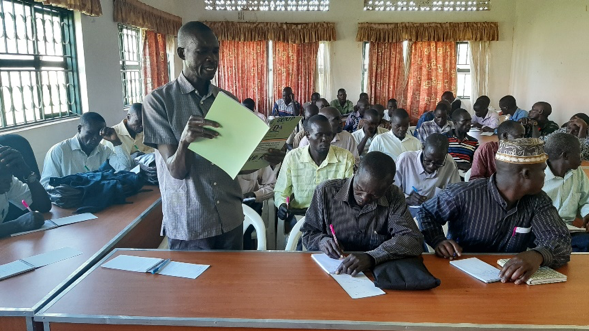KAMPALA, Uganda – As a community educator on child abuse and gender-based violence, Amos Ojandu often responds to domestic violence incidents in his local district of Yumbe in northern Uganda.
“My neighbour used to fight with his wife every day because he suspected her of cheating on him. When she refused to have sex with him, he would beat her in front of the children and kick her out of the house,” he recalls, describing how he would plead with the husband to allow her to return home.
When she refused to have sex with him, he would beat her in front of the children.
Gender-based violence (GBV) is a serious violation of human rights and a life-threatening health and protection issue. It refers to harmful acts directed at an individual based on their gender, and is rooted in gender inequality, the abuse of power and harmful norms. This can take several forms such as intimate partner violence, sexual violence, child marriage, and female genital mutilation.
In Uganda, a four-year programme known as 2gether 4 SRHR that started in 2018, aims to improve sexual and reproductive health and rights in the country. The partners UNAIDS, UNFPA, UNICEF and WHO are supporting the government in its initiatives to tackle gender-based violence and deliver greater access to health services and assistance to survivors of abuse or violence.
Funded by the Swedish International Development Cooperation Agency, the 2gether 4 SRHR programme is being implemented in eight districts in Uganda, to support the government in creating an enabling legal and policy environment that empowers people to exercise their sexual and reproductive rights, and to access quality integrated services to address sexual and reproductive health, HIV and gender-based violence.

The 2gether 4 SRHR programme has developed a variety of tools. These contain the training manual for male action groups, including service standards for male-friendly services, a training manual for health workers on the management of rape survivors, a quality support supervision tool for GBV services, a GBV registry for health facilities, and IEC materials for health and community workers.
In addition to the tools developed, more than 240 health workers and 75 district officers, police officers, and primary, and secondary school teachers have been trained under the programme on their roles and responsibilities in the prevention and response to gender-based violence, and support to survivors. Topics of training include clinical management, an appropriate response to survivors of gender-based violence, networking, and multi-sectoral responses to gender-based violence both for men and women.
At the regional level, WHO has advocated for the inclusion of men's participation in the regional agenda for reproductive and child health, and in addressing GBV issues.
Juliet Cheptoris, Focal Point for Gender-Based Violence at the Ugandan Ministry of Health, notes that in Uganda’s largely patriarchal society, male dominance is accepted and supported by strong community norms and values that can negatively affect health outcomes for men, women, adolescents and children.
The male involvement strategy will strategically improve population health outcomes in the country.
“The 2gether 4 SRHR programme uses evidence-based interventions guided by the male involvement strategy, which will strategically improve population health outcomes in the country,” she says.
Male involvement groups set up in each of the programme’s eight target districts aim to increase the participation of men and boys in activities related to reproductive, maternal, newborn, child, and adolescent health and nutrition; gender-based violence and violence against women; and sexual and reproductive health and rights, including HIV and tuberculosis.
“We train participants on men's roles and responsibilities in sexual and reproductive health and rights,” says Patrick Ozimuke, a nurse and trainer in Yumbe District.
“We educate all participants on their right to enjoy their sexuality to the fullest and to achieve their reproductive health goals and rights, but we highlight the fact that this must be done responsibly,” he adds, underscoring the need for men to participate effectively in their health and well-being while respecting the rights of their partners and children.
Health workers have been provided with the right information and mentored to deliver integrated services, including identifying gender-based violence cases through the reproductive health services they provide. They are now able to manage or refer patients for assistance.
Communities are also more willing to discuss and disclose issues around gender-based violence, says Dr Olive Sentumbwe, National Professional Officer for Family and Reproductive Health at WHO Uganda office, also noting that men are becoming more involved.
The potential benefits of men’s involvement include improved family health.
“The potential benefits of men’s involvement include improved family health, better communication between couples, joint and informed decision-making within households, and better sexual and reproductive health,” she says.
Community Educator Ojandu agrees, having participated in his local Male Involvement Group.
"Men and women have the same rights and we should always agree before we act. Sometimes children do not need to know that their parents are in disagreement because it also affects their psychosocial health,” he says.
Today, Ojandu organizes a community dialogue in which members discuss and advise each other on domestic problems. He and other community-level service providers note that reporting of gender-based violence has increased.
“People are no longer ashamed to report their cases. They know they have the law on their side, and we always make sure they get the right treatment."




